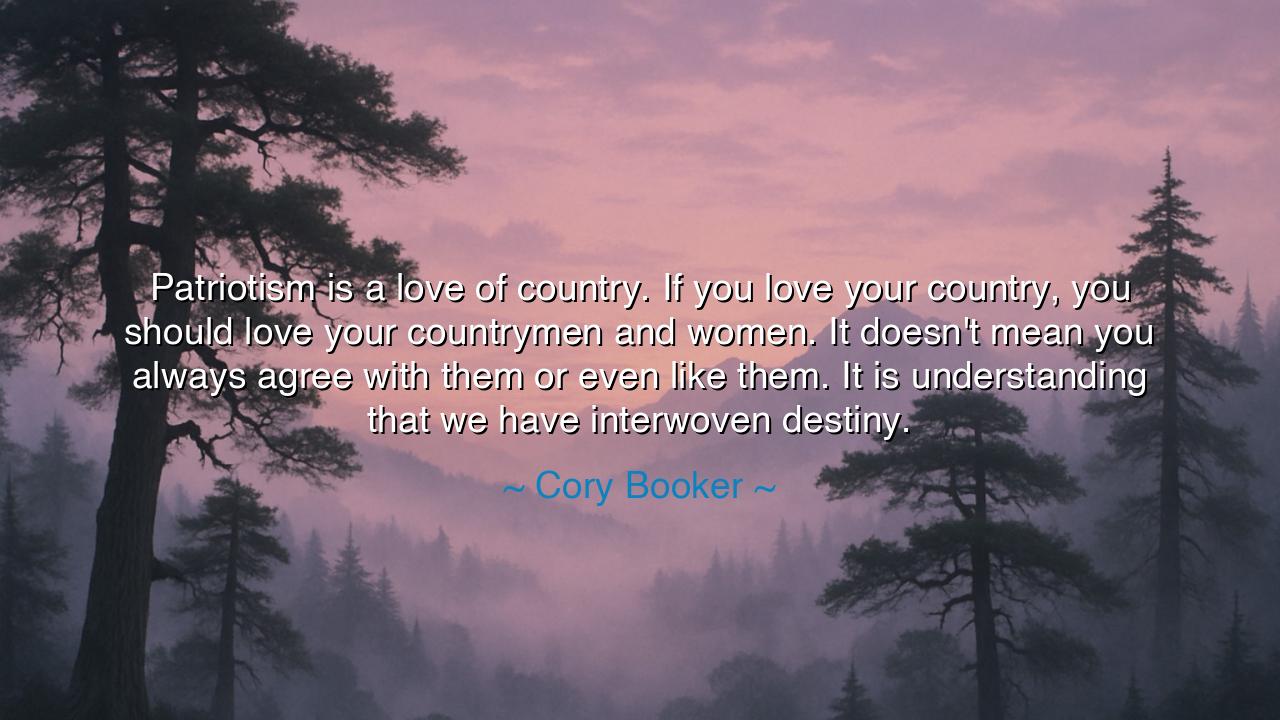
Patriotism is a love of country. If you love your country, you
Patriotism is a love of country. If you love your country, you should love your countrymen and women. It doesn't mean you always agree with them or even like them. It is understanding that we have interwoven destiny.






The statesman and moral voice Cory Booker once proclaimed: “Patriotism is a love of country. If you love your country, you should love your countrymen and women. It doesn't mean you always agree with them or even like them. It is understanding that we have interwoven destiny.” In these words lies a profound meditation on the moral depth of patriotism—a love that transcends mere allegiance to borders or symbols, embracing the shared humanity of all citizens. True patriotism recognizes that a nation’s strength is measured not only by its institutions, but by the bonds that connect its people in a tapestry of common fate.
In the wisdom of the ancients, the polis was as much a moral community as a political entity. Aristotle taught that citizenship entailed mutual responsibility and engagement in the common good, and that love of one’s city must include care for its inhabitants. Booker echoes this timeless insight: patriotism is not blind loyalty, nor is it measured by agreement or affection alone. It is an acknowledgment of the interdependence that binds citizens together—the understanding that the well-being of one is inseparable from the well-being of all.
History offers vivid examples of this principle in action. Consider the Reconstruction era following the American Civil War. Patriots on both sides had to grapple with the painful reality that nationhood required reconciliation. Freedom for the formerly enslaved was not merely a legal decree; it demanded that citizens, even those who had once opposed each other, recognize a shared destiny in the life of the republic. Booker’s reflection reminds us that love of country is expressed through the cultivation of mutual respect, even amid disagreement and tension.
The meaning of Booker’s words is deeply moral. Loving one’s country does not imply that we condone injustice, silence dissent, or seek uniformity of thought. On the contrary, patriotism requires the courage to embrace difference while maintaining the bonds of civic responsibility. It is in recognizing that our destinies are interwoven—that the fortunes of one affect the fortunes of all—that citizens discover the true nobility of devotion. Patriotism, therefore, is not self-centered pride, but relational and ethical engagement with the community.
Consider the story of Eleanor Roosevelt, who tirelessly championed human rights during times of social and political division. Her patriotism was not expressed in mere allegiance to institutions or ceremonies, but in the unwavering commitment to uphold the dignity and well-being of all Americans, even when it brought her into conflict with prevailing sentiment. She exemplified Booker’s principle: to love one’s country is to act for the good of its people, and to recognize that disagreement does not diminish responsibility or devotion.
Booker’s reflection also teaches that interwoven destiny is both a gift and a responsibility. Citizens cannot exist in isolation, for their lives are entwined through laws, economy, culture, and shared spaces. To practice true patriotism is to act with awareness of this connectedness, understanding that injustice to one diminishes all, and that the flourishing of one contributes to the flourishing of all. Love of country, then, is inseparable from the pursuit of equity, justice, and common welfare.
The lesson for all generations is profound: embrace a patriotism that is relational, ethical, and inclusive. Respect your fellow citizens, even in disagreement. Seek understanding, recognize shared challenges, and act for the good of the collective. Booker reminds us that disagreement does not weaken loyalty; rather, it is the recognition of interwoven destinies that elevates patriotism to its highest moral expression.
Practically, this calls citizens to cultivate empathy, engagement, and civic responsibility. Volunteer in communities different from your own, participate in civic dialogue, and advocate for policies that protect and uplift all citizens. Celebrate diversity as a strength and act to ensure that no one is left behind. In doing so, one embodies Booker’s vision: patriotism is not mere allegiance, but a moral commitment to the well-being and dignity of all countrymen and women, recognizing the inextricable web of shared destiny that binds us together.






AAdministratorAdministrator
Welcome, honored guests. Please leave a comment, we will respond soon